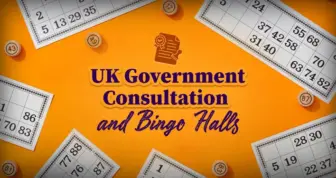
The UK government has launched a new consultation that could have huge implications for the way that bingo halls and gaming machines are regulated. Apart from bingo sites, the proposals, which are part of the ongoing Gambling White Paper reforms, are designed to bring clarity to what constitutes a bingo venue and how low-stakes gaming machines should be managed.
According to the Department for Culture, Media and Sport (DCMS), the review seeks to create a “clearer distinction between adult gaming centres (AGCs) and bingo premises”, to ensure that each type of venue operates under a licence “appropriate to their offering”. The review comes amid concerns that an increasing number of halls are relying more heavily on gaming machines to attract customers, which is blurring the lines between traditional bingo venues and AGCs.
One of the main suggestions being reviewed is the introduction of a dedicated “bingo area” that would occupy a minimum proportion of floor space within every licensed hall. Only bingo activity would be permitted in the area, with no gaming machines.
The government is also considering new rules for gaming machines, including restrictions on cabinet-style and in-fill gaming machines, as well as requirements for a minimum number of positions for playing bingo. The aim is to preserve the social and community-focused spirit of halls while maintaining clear regulatory oversight.
Buzz Bingo CEO Dominic Mansour has welcomed the opportunity to respond to the consultation, saying reform in the sector is “much needed”. He said:
“As the UK’s leading bingo operator, we believe reform in the sector is much needed. Bingo venues have a proud history of serving communities, providing a safe, low-stakes and community-focused form of entertainment that promotes social inclusion.
We believe there is a real benefit to a clearer distinction for bingo specifically, and reforms should remove the financial burden currently being taken on by the industry. A long-term viable operating model is essential for both our business and the communities in which we serve.”
Alongside the proposals for bingo premises, the government is also examining the use of Category D gaming machines, which are the lowest-stakes machines available in the UK. These include coin pushers, crane grabs, and low-stakes fruit machines typically found in family entertainment centres, arcades, and some pubs.
Currently, Category D machines are allowed without a licence or permit in certain settings. This is the result of a rule that was originally designed to support low-risk, family-friendly entertainment. However, with growing concerns about underage access and evolving gambling habits, the government is questioning whether this exemption still makes sense.
Two possible options are being considered: keeping the current exemption in place or removing it entirely, which would require all operators to obtain a permit or licence. The government is asking for opinions on whether the exemption still meets its original purpose and whether it leads to inconsistencies in regulation.
Another area under review is the licensing framework for bingo premises. Under existing law, a premises licence is required to offer bingo. But the government believes the definition of “bingo” may no longer reflect the wide variety of games and settings where it is now played. Officials are asking whether the current system is proportionate and fair, particularly when it comes to small-scale or community-based bingo events.
The consultation on the bingo halls will explore whether existing rules place unnecessary burdens on smaller operators or local groups running low-stakes bingo games. The UK government has explained that the aim is to find a balance between consumer protection and flexibility, to ensure that gambling regulations are “evidence-based and proportionate” while protecting children and vulnerable people from gambling-related harm.
Stakeholders, including operators, local authorities, and the general public, are being encouraged to provide their views before the consultation ends on 4 December 2025. Responses will help shape future legislation and determine how land-based gambling, especially in community-focused venues such as halls, should operate in the years to come.